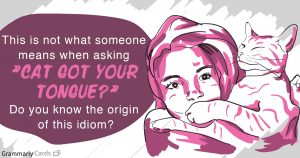Get exclusive deals you won't find anywhere else straight to your inbox.

Origins Of Common Idioms

Image from Grammarly.com
Idioms
Let’s not beat around the bush; no one uses idioms in everyday life. Maybe once in a blue moon, but anyone who says ‘it’s raining cats and dogs’ must be off their rocker.
Hang on - I’m only pulling your leg! Idioms are little maxims that have become part of our speech through extended use over time.
However, those with autism or learning difficulties can often struggle with idioms because of their figurative nature, and it’s not hard to see why!
We’ve compiled a list of the origins of the ten weirdest idioms to see if we can find some method in the madness.
-
Break the ice
Meaning: To begin a friendship, particularly with a new person
Origin: Back when ships were the main form of transport, ships would sometimes get stuck in ice during the winter months.
The country receiving the ship would send several smaller ships to ‘break the ice’, clearing the way for the incoming vessel and showing respect between the two countries.
-
Mad as a hatter
Meaning: To be completely mad
Origin: Despite its apparent links to ‘Alice in Wonderland’, this idiom actually originates from 17th century France.
Hat makers would often fall ill with mercury poisoning from the lead used for their felt, and the ensuing symptoms of timidity, tremors and irritability would make a person appear ‘mad’.
-
Turn a blind eye
Meaning: To wilfully ignore reality
Origin: British Naval Captain Horatio Nelson was blind in one eye.
When signalled to stop attacking a Danish fleet, Nelson held a telescope to his blind eye and claimed not to see the signal.
He then continued attacking and emerged victorious.
-
Give the cold shoulder
Meaning: To behave in a hostile way towards someone
Origin: In medieval England, it was the custom to be given a slice of meat from a shoulder joint when your host wanted you to leave.
It was, essentially, a polite way of saying ‘please leave now!’
-
Let your hair down
Meaning: To relax and let loose
Origin: Another medieval saying!
Ladies of the period were expected to tie up their hair when in public, so they could only ‘let their hair down’ and relax when at home.
And, finally, perhaps the most famous idiom of all:
6. It’s raining cats and dogs
Meaning: To rain heavily
Origin: Cats and dogs would often hide in the warmth of thatched roofs, but when it rained, they fled in search of better shelter.
The barrage of cats and dogs jumping from high up made it seem as if was really raining cats and dogs!
Want to help your child practise idioms? For on-the-go practise, try our Idioms Fun Deck, featuring brightly-coloured playing cards which explain idioms through amusing cartoons.



